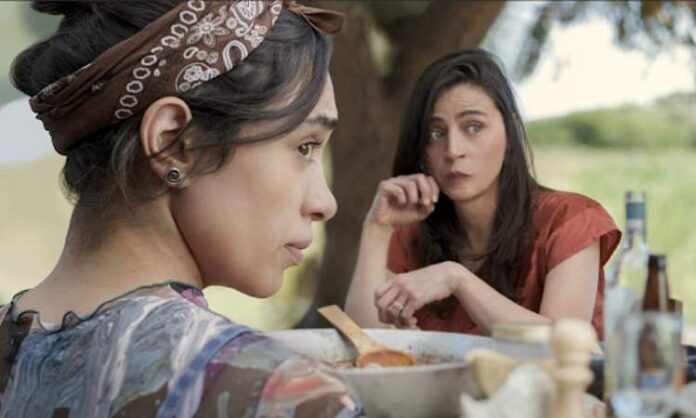Familia unfolds almost entirely around a meal table in the Mexican countryside. The large family consists of an ageing father, his younger partner, his four children (three daughters and a son) and their respective spouses, partners and kids. The middle-aged father, Leo (Daniel Giménez Cacho), continues to run the family’s olive business, living on a massive ranch with his girlfriend Clara (Maribel Verdú), and tending to the needs of Benny (Ricardo Selmen), his adult son with special needs. Rebeca (Ilse Salas), Julia (Cassandra Ciangherotti) and Mariana (Natalia Solián) are Leo’s daughters. Rebeca is a successful anaesthesiologist who is married to an American, and has a teenage girl and boy. Julia, a writer like her late mother, is coming to terms with her choice of career. A mother of a young daughter, her marriage is on shaky ground on the account of her intermittent infidelity. Mariana is heavily pregnant during the events of the film, and has brought her girlfriend, Mónica (Natalia Plascencia), to meet her family for the first time. Then there’s the family’s housekeeper, Teresa (Ángeles Cruz), who has been with them since the children were babies. As the large, close-knit group sits around the luncheon table in the midst of bucolic bliss, it is evident there is much love to be had. Inside jokes and banter abound as they converge from near and far to partake in the periodic mealtime ritual. But so much love and shared experience bring with it enough complication to go around. It doesn’t take long for uncomfortable questions and subjects to be broached. Rebeca’s more reserved husband echoes what we’re all feeling. “Why does everything need to be discussed publicly? Why can’t there be some privacy?”
Director – Rodrigo García
Cast – Daniel Giménez Cacho, Ilse Salas, Cassandra Ciangherotti, Natalia Solián, Maribel Verdú, Natalia Plascencia, Brian Shortall, Ricardo Selmen
Streaming On – Netflix
Leo kicks off lunch by apologising to his teenage grandson (Rebeca’s son) for always being short with him. This is done in response to the latter’s observation that Leo only favours the women of the household. Leo promises to do better (he can’t help it that he’s been surrounded by women all his life). The second announcement concerns the future of their beloved olive farm. With Leo advancing in age, and his children off doing their own thing, he is entertaining offers seriously. If sold, the proceeds will be equally divided, with Leo managing Benny’s share. Taken completely by surprise, the three sisters press him for the exact offer, those showing interest, and the future of the house. Admittedly, the talk of a sale, triggers complex emotions. The olive ranch has been in their family for ages. They grew up in that house, their mother’s ashes were scattered amongst the trees, and Rebeca’s children were conceived there. Disposing of it would be akin to losing a dear family member. But here’s the thing: Leo isn’t getting any younger, and with no hands-on help from his children, he can’t manage on his own anymore. He wishes to retire in peace and live happily with Clara and Benny.
Revolving around conversations at a table, with only a handful of interactions outside of it, it is imperative for the writing to be spot on. The subtle nuances of familial relationships and the shadow of the past are captured exceedingly well. Lots is said while many things can be easily deduced. Beneath the bonhomie and understanding, much has the capacity to set off a fuse. Leo is a charming, larger-than-life personality who wishes for answers and resolution right then and there. This sort of behaviour doesn’t always go down well with his daughters. During a one-on-one chat, he tells Julia that he doesn’t feel she has the mental make-up to be a writer (something she’s been grappling with for a while now). At the meal, he presses Mariana about the identity of the father. When she refuses to speak about it, he questions her choice of getting pregnant by a man when she wishes to be with women. In the guise of being an honest, communicative father, his lack of sensitivity and underlying resentment come to the surface. Another aspect that looms is the sceptre of their dead mother. She exerted a great influence and her presence is still felt around the farm.
The cast’s full range of ability is seen in each exchange…as the conversations fluctuate from loving to heated and then back to a place of understanding and empathy. It is so real that you feel you know this family intimately. So many things are left unsaid, but it isn’t hard to pick up what’s really going on from a gesture or a glance. The film is bittersweet. It is the time for change and yet, it is hard to let go of such shared experience at the drop of a hat. It is indeed a challenge to set the narrative in a single space because you need the acting, writing and direction to come together as one – and that’s precisely what it pulls off. Everything relies on character and dialogue, with no external influences present to play the role of fillers. With Familia, Rodrigo García gives us an intimate and nuanced portrait of a beloved household in transition.
#intimate #nuanced #characterdriven #portrait #family #Cinema #express

